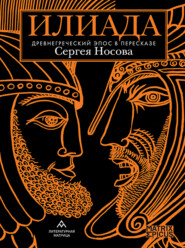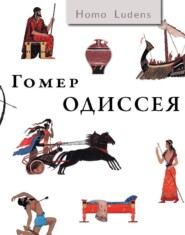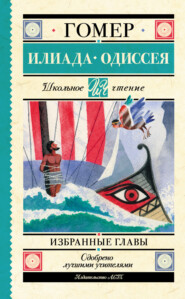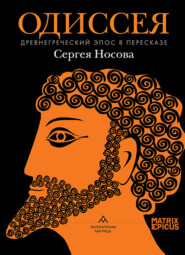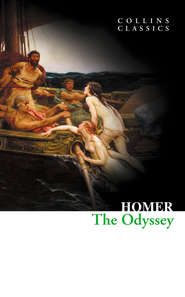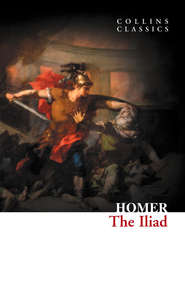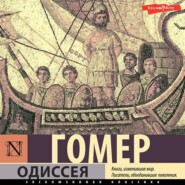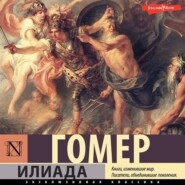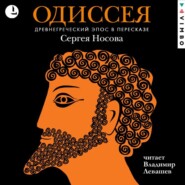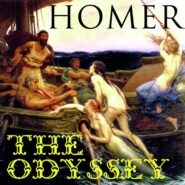По всем вопросам обращайтесь на: info@litportal.ru
(©) 2003-2024.
✖
The Iliad
Настройки чтения
Размер шрифта
Высота строк
Поля
So spake he, and Hector rejoiced greatly to hear his saying, and went into the midst and restrained the battalions of the Trojans, with his spear grasped by the middle; and they all sate them down. But the flowing-haired Achaians kept shooting at him, aiming with arrows and casting stones. But Agamemnon king of men cried aloud: "Refrain, ye Argives; shoot not, ye sons of the Achaians; for Hector of the glancing helm hath set himself to say somewhat."
So spake he, and they refrained from battle and made silence speedily. And Hector spake between the two hosts, "Hear of me, Trojans and well-greaved Achaians, the saying of Alexandros, for whose sake strife hath come about. He biddeth the other Trojans and all the Achaians to lay down their goodly armour on the bounteous earth, and himself in the midst and Menelaos dear to Ares to fight alone for Helen and all her wealth. And whichsoever shall vanquish and gain the upper hand, let him take all the wealth aright, and the woman, and bear them home; but let all of us pledge friendship and sure oaths."
So spake he, and they all kept silence and were still. Then in their midst spake Menelaos of the loud war-cry: "Hearken ye now to me, too; for into my heart most of all is grief entered; and I deem that the parting of Argives and Trojans hath come at last; seeing ye have endured many ills because of my quarrel and the first sin of Alexandros. And for whichsoever of us death and fate are prepared, let him lie dead: and be ye all parted with speed. Bring ye two lambs, one white ram and one black ewe, for earth and sun; and let us bring one for Zeus. And call hither great Priam, that he may pledge the oath himself, seeing he hath sons that are overweening and faithless, lest any by transgression do violence to the oath of Zeus; for young men's hearts are ever lifted up. But wheresoever an old man entereth in, he looketh both before and after, whereby the best issue shall come for either side."
So spake he, and Achaians and Trojans were glad, deeming that they should have rest from grievous war. So they refrained their chariots to the ranks, and themselves alighted and doffed their arms. And these they laid upon the earth each close to each, and there was but small space between. And Hector sent two heralds to the city will all speed, to bring the lambs, and to call Priam. And lord Agamemnon sent forth Talthybios to go to the hollow ships, and bade him bring a ram; and he was not disobedient to noble Agamemnon.
Now Iris went with a message to white-armed Helen in the likeness of her husband's sister, the spouse of Antenor's son, even her that lord Helikaon Antenor's son had to wife, Laodike fairest favoured of Priam's daughters. And in the hall she found Helen weaving a great purple web of double fold, and embroidering thereon many battles of horse-taming Trojans and mail-clad Achaians, that they had endured for her sake at the hands of Ares. So fleet-footed Iris stood by her side and said: "Come hither, dear sister, that thou mayest see the wondrous doings of horse-taming Trojans and mail-clad Achaians. They that erst waged tearful war upon each other in the plain, eager for deadly battle, even they sit now in silence, and the tall spears are planted by their sides. But Alexandros and Menelaos dear to Ares will fight with their tall spears for thee; and thou wilt be declared the dear wife of him that conquereth."
So spake the goddess, and put into her heart sweet longing for her former husband and her city and parents.
Forthwith she veiled her face in shining linen, and hastened from her chamber, letting fall a round tear; not unattended, for there followed with her two handmaidens, Aithre daughter of Pittheus and ox-eyed Klymene. Then came she straightway to the place of the Skaian gates. And they that were with Priam and Panthoos and Thymoites and Lampos and Klytios and Hiketaon of the stock of Ares, Oukalegon withal and Antenor, twain sages, being elders of the people, sat at the Skaian gates. These had now ceased from battle for old age, yet were they right good orators, like grasshoppers that in a forest sit upon a tree and utter their lily-like [supposed to mean "delicate" or "tender"] voice; even so sat the elders of the Trojans upon the tower. Now when they saw Helen coming to the tower they softly spake winged words one to the other: "Small blame is it that Trojans and well-greaved Achaians should for such a woman long time suffer hardships; marvellously like is she to the immortal goddesses to look upon. Yet even so, though she be so goodly, let her go upon their ships and not stay to vex us and our children after us."
So said they, and Priam lifted up his voice and called to Helen: "Come hither, dear child, and sit before me, that thou mayest see thy former husband and they kinsfolk and thy friends. I hold thee not to blame; nay, I hold the gods to blame who brought on me the dolorous war of the Achaians – so mayest thou now tell me who is this huge hero, this Achaian warrior so goodly and great. Of a truth there are others even taller by a head; yet mine eyes never behold a man so beautiful nor so royal; for he is like unto one that is a king."
And Helen, fair among women, spake and answered him: "Reverend art thou to me and dread, dear father of my lord; would that sore death had been my pleasure when I followed thy son hither, and left my home and my kinsfolk and my daughter in her girlhood and the lovely company of mine age-fellows. But that was not so, wherefore I pine with weeping. Now will I tell thee that whereof thou askest me and enquirest. This is Atreides, wide-ruling Agamemnon, one that is both a goodly king and mighty spearman. And he was my husband's brother to me, ah shameless me; if ever such an one there was."
So said she, and the old man marvelled at him, and said: "Ah, happy Atreides, child of fortune, blest of heaven; now know I that many sons of the Achaians are subject to thee. Erewhile fared I to Phrygia, the land of vines, and there saw I that the men of Phrygia, they of the nimble steeds, were very many, even the hosts of Otreus and godlike Mygdon, that were then encamped along the banks of Sangarios. For I too being their ally was numbered among them on the day that the Amazons came, the peers of men. Yet were not even they so many as are the glancing-eyed Achaians."
And next the old man saw Odysseus, and asked: "Come now, tell me of this man too, dear child, who is he, shorter by a head than Agamemnon son of Atreus, but broader of shoulder and of chest to behold? His armour lieth upon the bounteous earth, and himself like a bell-wether rangeth the ranks of warriors. Yea, I liken him to a thick-fleeced ram ordering a great flock of ewes."
Then Helen sprung of Zeus made answer to him: "Now this is Laertes' son, crafty Odysseus, that was reared in the realm of Ithaka, rugged though it be, and skilled in all the ways of wile and cunning device."
Then sage Antenor made answer to her: "Lady, verily the thing thou sayest is true indeed, for erst came goodly Odysseus hither also on an embassage for thee, in the company of Menelaos dear to Ares; and I gave them entertainment and welcomed them in my halls, and learnt the aspect of both and their wise devices. Now when they mingled with the Trojans in the assembly, while all stood up Menelaos overpassed them all by the measure of his broad shoulders; but when both sat down, Odysseus was the more stately. And when they began to weave the web of words and counsel in the face of all, then Menelaos harangued fluently, in few words, but very clearly, seeing he was not long of speech, neither random, though in years he was the younger. But whenever Odysseus full of wiles rose up, he stood and looked down, with eyes fixed upon the ground, and waved not his staff whether backwards or forwards, but held it stiff, like to a man of no understanding; one would deem him to be churlish, and naught but a fool. But when he uttered his great voice from his chest, and words like unto the snowflakes of winter, then could no mortal man contend with Odysseus; then marvelled we not thus to behold Odysseus' aspect."
And thirdly the old man say Aias, and asked: "Who then is this other Achaian warrior, goodly and great, preeminent among the Archives by the measure of his head and broad shoulders?"
And long-robed Helen, fair among women, answered: "This is huge Aias, bulwark of the Achaians. And on the other side amid the Cretans standeth Idomeneus like a god, and about him are gathered the captains of the Cretans. Oft did Menelaos dear to Ares entertain him in our house whene'er he came from Crete. And now behold I all the other glancing-eyed Achaians, whom well I could discern and tell their names; but two captains of the host can I not see, even Kastor tamer of horses and Polydeukes the skilful boxer, mine own brethren, whom the same mother bare. Either they came not in the company from lovely Lakedaimon; or they came hither indeed in their seafaring ships, but now will not enter into the battle of the warriors, for fear of the many scornings and revilings that are mine."
So said she; but them the life-giving earth held fast there in Lakedaimon, in their dear native land.
Meanwhile were the heralds bearing through the city the holy oath-offerings, two lambs and strong-hearted wine, the fruit of the earth, in a goat-skin bottle. And the herald Idaios bare the shining bowl and golden cups; and came to the old man and summoned him and said: "Rise, thou son of Laomedon. The chieftains of the horse-taming Trojans and mail-clad Achaians call on thee to go down into the plain, that ye may pledge a trusty oath. But Alexandros and Menelaos dear to Ares will fight with their long spears for the lady's sake; and let lady and treasure go with him that shall conquer. And may we that are left pledge friendship and trusty oaths and dwell in deep-soiled Troy, and they shall depart to Argos pasture-land of horses and Achaia home of fair women."
So said he, and the old man shuddered and base his companions yoke the horses; and they with speed obeyed. Then Priam mounted and drew back the reins, and by his side Antenor mounted the splendid chariot. So the two drave the fleet horses through the Skaian gates to the plain. And when they had come even to the Trojans and Achaians, they went down from the chariots upon the bounteous earth, and marched into the midst of Trojans and Achaians. Then forthwith rose up Agamemnon king of men, and up rose Odysseus the man of wiles; and the lordly heralds gathered together the holy oath-offerings of the gods, and mingled the wine in a bowl, and poured water over the princes' hands. And Atreides put forth his hand and drew his knife that hung ever beside his sword's great sheath, and cut the hair from off the lambs' heads; and then the heralds portioned it among the chief of the Trojans and Achaians. Then in their midst Atreus' son lifted up his hands and prayed aloud: "Father Zeus, that rulest from Ida, most glorious, most great, and thou Sun that seest all things and hearest all things, and ye Rivers and thou Earth, and ye that in the underworld punish men outworn, whosoever sweareth falsely; be ye witnesses, and watch over the faithful oath. If Alexandros slay Menelaos, then let him have Helen to himself and all her possessions; and we will depart on our seafaring ships. But if golden-haired Menelaos slay Alexandros, then let the Trojans give back Helen and all her possessions and pay the Argives the recompense that is seemly, such as shall live among men that shall be hereafter. But if so be that Priam and Priam's sons will not pay the recompense unto me when Alexandros falleth, then will I fight on thereafter for the price of sin, and abide here till I compass the end of war."
So said he, and cut the lambs' throats with the pitiless knife. Them he laid gasping upon the ground, failing of breath, for the knife had taken their strength from them; and next they drew the wine from the bowl into the cups, and poured it forth and prayed to the gods that live for ever. And thus would say many an one of Achaians and Trojans: "Zeus most glorious, most great, and all ye immortal gods, which folk soe'er be first to sin against the oaths, may their brains be so poured forth upon the earth even as this wine, theirs and their children's; and let their wives be made subject unto strangers."
So spake they, but the son of Kronos vouchsafed not yet fulfilment. And in their midst Priam of the seed of Dardanos uttered his saying: "Hearken to me, Trojans and well-greaved Achaians. I verily will return back to windy Ilios, seeing that I can in no wise bear to behold with mine eyes my dear son fighting with Menelaos dear to Ares. But Zeus knoweth, and all the immortal gods, for whether of the twain the doom of death is appointed."
So spake the godlike man, and laid the lambs in his chariot, and entered in himself, and drew back the reins; and by his side Antenor mounted the splendid chariot. So they departed back again to Ilios; and Hector son of Priam and goodly Odysseus first meted out a space, and then they took the lots, and shook them in a bronze-bound helmet, to know whether of the twain should first cast his spear of bronze. And the people prayed and lifted up their hands to the gods; and thus would say many an one of Achaians and Trojans: "Father Zeus, that rulest from Ida, most glorious, most great; whichsoe'er it be that brought this trouble upon both peoples, vouchsafe that he may die and enter the house of Hades; that so for us peace may be assured and trusty oaths."
So said they; and great Hector of the glancing plume shook the helmet, looking behind him; and quickly leapt forth the lot of Paris. Then the people sat them down by ranks where each man's high-stepping horses and inwrought armour lay. And upon his shoulders goodly Alexandros donned his beauteous armour, even he that was lord to Helen of the lovely hair. First upon his legs set he his greaves, beautiful, fastened with silver ankle-clasps; next upon his breast he donned the corslet of his brother Lykaon, and fitted it upon himself. And over his shoulders cast he his silver-studded sword of bronze, and then a shield great and sturdy. And on his mighty head he set a wrought helmet of horse-hair crest, whereover the plume nodded terribly, and he took him a strong spear fitted to his grasp. And in like wise warlike Menelaos donned his armour.
So when they had armed themselves on either side in the throng, they strode between Trojans and Achaians, fierce of aspect, and wonder came on them that beheld, both on the Trojans tamers of horses and on the well-greaved Achaians. Then took they their stand near together in the measured space, brandishing their spears in wrath each against other. First Alexandros hurled his far shadowing spear, and smote on Atreides' round shield; but the bronze brake not through, for its point was turned in the stout shield. Next Menelaos son of Atreus lifted up his hand to cast, and made prayer to father Zeus: "King Zeus, grant me revenge on him that was first to do me wrong, even on goodly Alexandros, and subdue thou him at my hands; so that many an one of men that shall be hereafter may shudder to wrong his host that hath shown him kindness."
So said he, and poised his far-shadowing spear, and hurled, and smote on the round shield of the son of Priam. Through the bright shield went the ponderous spear and through the inwrought breastplate it pressed on; and straight beside his flank the spear rent the tunic, but he swerved and escaped black death. Then Atreides drew his silver-studded sword, and lifted up his hand and smote the helmet-ridge; but the sword shattered upon it into three, yea four, and fell from his hand. Thereat Atreides looked up to the wide heaven and cried: "Father Zeus, surely none of the gods is crueller than thou. Verily I thought to have gotten vengeance on Alexandros for his wickedness, but now my sword breaketh in my hand, and my spear sped from my grasp in vain, and I have not smitten him."
So saying, he leapt upon him and caught him by his horse-hair crest, and swinging him round dragged him towards the well-greaved Achaians; and he was strangled by the embroidered strap beneath his soft throat, drawn tight below his chin to hold his helm. Now would Menelaos have dragged him away and won glory unspeakable, but that Zeus' daughter Aphrodite was swift to mark, and tore asunder for him the strap of slaughtered ox's hide; so the helmet came away empty in his stalwart hand. Thereat Menelaos cast it with a swing toward the well-greaved Achaians, and his trusty comrades took it up; and himself sprang back again eager to slay him with spear of bronze. But Aphrodite snatched up Paris, very easily as a goddess may, and hid him in thick darkness, and sent him down in his fragrant perfumed chamber; and herself went to summon Helen. Her she found on the high tower, and about her the Trojan women thronged. So with her hand she plucked her perfumed raiment and shook it and spake to her in the likeness of an aged dame, a wool-comber that was wont to work for her fair wool when she dwelt in Lakedaimon, whom too she greatly loved. Even in her likeness fair Aphrodite spake: "Come hither; Alexandros summoneth thee to go homeward. There is he in his chamber and inlaid bed, radiant in beauty and vesture; nor wouldst thou deem him to be come from fighting his foe, but rather to be faring to the dance, or from the dance to be just resting and set down."
So said she, and stirred Helen's soul within her breast; and when now she marked the fair neck and lovely breast and sparkling eyes of the goddess, she marvelled straightway and spake a word and called upon her name: "Strange queen, why art thou desirous now to beguile me? Verily thou wilt lead me further on to some one of the people cities of Phrygia or lovely Maionia, if there too thou hast perchance some other darling among mortal men, because even now Menelaos hath conquered goodly Alexandros, and will lead me, accursed me, to his home. Therefore thou comest hither with guileful intent. Go and sit thou by his side and depart from the way of the gods; neither let thy feet ever bear thee back to Olympus, but still be vexed for his sake and guard him till he make thee his wife or perchance his slave. But thither will I not go – that were a sinful thing – to array the bed of him; all the women of Troy will blame me thereafter; and I have griefs untold within my soul."
Then in wrath bright Aphrodite spake to her: "Provoke me not, rash woman, lest in mine anger I desert thee, and hate thee even as now I love thee beyond measure, and lest I devise grievous enmities between both, even betwixt Trojans and Achaians, and so thou perish in evil wise."
So said she, and Helen sprung of Zeus was afraid, and went wrapped in her bright radiant vesture, silently, and the Trojan women marked her not; and the goddess led the way.
Now when they were come to the beautiful house of Alexandros the handmaidens turned straightway to their tasks, and the fair lady went to the high-roofed chamber; and laughter-loving Aphrodite took for her a chair and brought it, even she the goddess, and set it before the face of Paris. There Helen took her seat, the child of aegis-bearing Zeus, and with eyes turned askance spake and chode her lord: "Thou comest back from battle; would thou hadst perished there, vanquished of that great warrior that was my former husband. Verily it was once thy boast that thou wast a better man than Menelaos dear to Ares, in the might of thine arm and thy spear. But go now, challenge Menelaos, dear to Ares to fight thee again face to face. Nay, but I, even I, bid thee refrain, nor fight a fight with golden-haired Menelaos man to man, neither attack him recklessly, lest perchance thou fall to his spear anon."
And Paris made answer to her and said: "Chide not my soul, lady, with cruel taunts. For now indeed hath Menelaos vanquished me with Athene's aid, but another day may I do so unto him; for we too have gods with us. But come now, let us have joy of love upon our couch; for never yet hath love so enwrapped my heart – not even then when first I snatched thee from lovely Lakedaimon and sailed with thee on my sea-faring ships, and in the isle of Kranae had converse with thee upon thy couch in love – as I love thee now and sweet desire taketh hold upon me." So saying he led the way to the couch, and the lady followed with him.
Thus laid they them upon their fretted couch; but Atreides the while strode through the host like to a wild beast, if anywhere he might set eyes on godlike Alexandros. But none of the Trojans or their famed allies could discover Alexandros to Menelaos dear to Ares. Yet surely did they in no wise hide him for kindliness, could any have seen him; for he was hated of all even as black death. So Agamemnon king of men spake among them there: "Hearken to me, Trojans and Dardanians and allies. Now is victory declared for Menelaos dear to Ares; give ye back Helen of Argos and the possessions with her, and pay ye the recompense such as is seemly, that it may live even among men that shall be hereafter." So said Atreides, and all the Achaians gave assent.
BOOK IV
Now the gods sat by Zeus and held assembly on the golden floor, and in the midst the lady Hebe poured them their nectar: they with golden goblets pledged one another, and gazed upon the city of the Trojans. Then did Kronos' son essay to provoke Hera with vexing words, and spake maliciously: "Twain goddesses hath Menelaos for his helpers, even Hera of Argos and Alalkomenean Athene. Yet these sit apart and take there pleasure in beholding; but beside that other ever standeth laughter-loving Aphrodite and wardeth off fate from him, and now hath she saved him as he thought to perish. But of a truth the victory is to Menelaos dear to Ares; so let us take thought how these things shall be; whether once more we shall arouse ill war and the dread battle-din, or put friendship between the foes. Moreover if this were welcome to all and well pleasing, may the city of king Priam yet be an habitation, and Menelaos take back Helen of Argos."
So said he, but Athene and Hera murmured thereat, who were sitting by him and devising ills for the Trojans. Now Athene held her peace and said not anything, for wrath at father Zeus, and fierce anger gat hold upon her: But Hera's breast contained not her anger, and she spake: "Most dread son of Kronos, what word is this thou hast spoken? How hast thou the will to make my labour void and of none effect, and the sweat of my toil that I sweated, when my horses were wearied with my summoning of the host, to be the plague of Priam and his sons? Do as thou wilt; but we other gods do not all approve thee."
Then in sore anger Zeus the cloud-gatherer spake to her: "Good lack, how have Priam and Priam's sons done thee such great wrong that thou art furiously minded to sack the established citadel of Ilios? Perchance wert thou to enter within the gates and long walls and devour Priam raw, and Priam's sons and all the Trojans, then mightest thou assuage thine anger. Do as thou art minded, only let not this quarrel hereafter be to me and thee a sore strife between us both. And this moreover will I say to thee, and do thou lay it to they heart; whene'er I too be of eager mind to lay waste to a city where is the race of men that are dear to thee, hinder thou not my wrath, but let me be, even as I yield to thee of free will, yet with soul unwilling. For all cities beneath sun and starry heaven that are the dwelling of mortal men, holy Ilios was most honoured of my heart, and Priam and the folk of Priam of the good ashen spear. For never did mine altar lack the seemly feast, even drink-offering and burnt-offering, the worship that is our due."
Then Helen the ox-eyed queen made answer to him: "Of a surety three cities are there that are dearest far to me, Argos and Sparta and wide-wayed Mykene; these lay thou waste whene'er they are found hateful to thy heart; not for them will I stand forth, nor do I grudge thee them. For even if I be jealous and would forbid thee to overthrow them, yet will my jealousy not avail, seeing that thou art stronger far than I. Still must my labour too not be made of none effect; for I also am a god, and my lineage is even as thine, and Kronos the crooked counsellor begat me to the place of honour in double wise, by birthright, and because I am named thy spouse, and thou art king among all the immortals. Let us indeed yield each to other herein, I to thee and thou to me, and the rest of the immortal gods will follow with us; and do thou with speed charge Athene to betake her to the fierce battle din of Trojans and Achaians, and to essay that the Trojans may first take upon them to do violence to the Achaians in their triumph, despite the oaths."
So said she, and the father of men and gods disregarded not; forthwith he spake to Athene winged words: "Betake thee with all speed to the host, to the midst of Trojans and Achaians, and essay that the Trojans may first take upon them to do violence to the Achaians in their triumph, despite the oaths."
So spake he, and roused Athene that already was set thereon; and from Olympus' heights she darted down. Even as the son of Kronos the crooked counsellor sendeth a star, a portent for mariners or a wide host of men, bright shining, and therefrom are scattered sparks in multitude; even in such guise sped Pallas Athene to earth, and leapt into their midst; and astonishment came on them that beheld, on horse-taming Trojans and well-greaved Achaians. And thus would many an one say, looking at his neighbor: "Of a surety either shall sore war and the fierce battle din return again; or else Zeus doth stablish peace between the foes, even he that is men's dispenser of battle."
Thus would many an one of Achaians and Trojans say. Then the goddess entered the throng of Trojans in the likeness of a man, even Antenor's son Laodokos, a stalwart warrior, and sought for godlike Pandaros, if haply she might find him. Lykaon's son found she, the noble and stalwart, standing, and about him the stalwart ranks of the shield-bearing host that followed him from the streams of Aisepos. So she came near and spake winged words: "Wilt thou now hearken to me, thou wise son of Lykaon? Then wouldst thou take heart to shoot a swift arrow at Menelaos, and wouldst win favour and glory before all the Trojans, and before king Alexandros most of all. Surely from him first of any wouldst thou receive glorious gifts, if perchance he see Menelaos, Atreus' warrior son, vanquished by thy dart and brought to the grievous pyre. Go to now, shoot at glorious Menelaos, and vow to Apollo, the son of light [Or, perhaps, "the Wolf-born"], the lord of archery, to sacrifice a goodly hecatomb of firstling lambs when thou art returned to thy home, in the city of holy Zeleia."
So spake Athene, and persuaded his fool's heart. Forthwith he unsheathed his polished bow of horn of a wild ibex that he himself had erst smitten beneath the breast as it came forth from a rock, the while he awaited in a lurking-place; and had pierced it in the chest, so that it fell backward on the rock. Now from its head sprang there horns of sixteen palms; these the artificer, even the worker in horn, joined cunningly together, and polished them all well and set the top of gold thereon. So he laid it down when he had well strung it, by resting it upon the ground; and his staunch comrades held their shields before him, lest the warrior sons of the Achaians should first set on them, ere Menelaos, Atreus' son, were smitten. Then opened he the lid of his quiver and took forth a feathered arrow, never yet shot, a source of grievous pangs; and anon he laid the bitter dart upon the string and vowed to Apollo, the son of light, the lord of archery, to sacrifice a goodly hecatomb of firstling lambs when he should have returned to his home in the city of holy Zeleia. Then he took the notch and string of oxes' sinew together, and drew, bringing to his breast the string, and to the bow the iron head. So when he had now bent the great bow into a round, the horn twanged, and the string sang aloud, and the keen arrow leapt eager to wing his way amid the throng.
But the blessed gods immortal forgat not thee, Menelaos; and before all the daughter of Zeus, the driver of the spoil, who stood before thee and warded off the piercing dart. She turned it just aside from the flesh, even as a mother driveth a fly from her child that lieth in sweet slumber; and with her own hand guided it where the golden buckles of the belt were clasped and the doubled breastplate met them. So the bitter arrow lighted upon the firm belt; through the inwrought belt it sped and through the curiously wrought breastplate it pressed on and through the taslet [and apron or belt set with metal, worn below the corslet] he wore to shield his flesh, a barrier against darts; and this best shielded him, yet it passed on even through this. Then did the arrow graze the warrior's outermost flesh, and forthwith the dusky blood flowed from the wound.
As when some woman of Maionia or Karia staineth ivory with purple, to make a cheek-piece for horses, and it is laid up in the treasure chamber, and many a horseman prayeth for it to wear; but it is laid up to be a king's boast, alike an adornment for his horse and a glory for his charioteer; even in such wise, Menelaos, were thy shapely thighs stained with blood and thy legs and thy fair ankles beneath.
Thereat shuddered Agamemnon king of men when he saw the black blood flowing from the wound. And Menelaos dear to Ares likewise shuddered; but when he saw how thread [by which the iron head was attached to the shaft] and bards were without, his spirit was gathered in his breast again. Then lord Agamemnon moaned deep, and spake among them, holding Menelaos by the hand; and his comrades made moan the while: "Dear brother, to thy death, meseemeth, pledged I these oaths, setting thee forth to fight the Trojans alone before the face of the Achaians; seeing that the Trojans have so smitten thee, and trodden under floor the trusty oaths. Yet in no wise is an oath of none effect, and the blood of lambs and pure drink-offerings and the right hands of fellowship wherein we trusted. For even if the Olympian bring not about the fulfilment forthwith, yet doth he fulfil at last, and men make dear amends, even with their own heads and their wives and little ones. Yea of a surety I know this in heart and soul; the day shall come for holy Ilios to be laid low, and Priam and the folk of Priam of the good ashen spear; and Zeus the son of Kronos enthroned on high, that dwelleth in the heaven, himself shall brandish over them all his lowring aegis, in indignation at this deceit. Then shall all this not be void; yet shall I have sore sorrow for thee, Menelaos, if thou die and fulfil the lot of life. Yea in utter shame should I return to thirsty Argos, seeing that the Achaians will forthwith bethink them of their native land, and so should we leave to Priam and the Trojans their boast, even Helen of Argos. And the earth shall rot thy bones as thou liest in Troy with thy task unfinished: and thus shall many an overweening Trojan say as he leapeth upon the tomb of glorious Menelaos: 'Would to God Agamemnon might so fulfil his wrath in every matter, even as now he led hither the host of the Achaians for naught, and hath gone home again to his dear native land with empty ships, and hath left noble Menelaos behind.' Thus shall men say hereafter: in that day let the wide earth gape for me."
But golden-haired Menelaos encouraged him and said: "Be of good courage, neither dismay at all the host of the Achaians. The keen dart lighted not upon a deadly spot; my glistening belt in front stayed it, and the kirtle of mail beneath, and the taslet that the coppersmiths fashioned."
Then lord Agamemnon answered him and said: "Would it may be so, dear Menelaos. But the leech shall feel the wound, and lay thereon drugs that shall assuage thy dire pangs."
So saying he spake to godlike Talthybios, his herald: "Talthybios, with all speed call Machaon hither, the hero son of Asklepios the noble leech, to see Menelaos, Atreus' warrior son, whom one well skilled in archery, some Trojan or Lykian, hath wounded with a bow-shot, to his glory and our grief."
So said he, and the herald heard him and disregarded not, and went his way through the host of mail-clad Achaians to spy out the hero Machaon. Him he found standing, and about him the stalwart ranks of the shield-bearing host that followed him from Trike, pasture land of horses. So he came near and spake his winged words: "Arise, thou son of Asklepios. Lord Agamemnon calleth thee to see Menelaos, captain of the Achaians, whom one well skilled in archery, some Trojan or Lykian, hath wounded with a bow-shot, to his glory and our grief."
So saying he aroused his spirit in his breast, and they went their way amid the throng, through the wide host of the Achaians. And when they were now come where was golden-haired Menelaos wounded, and all as many as were chieftains gathered around him in a circle, the godlike hero came and stood in their midst, and anon drew forth the arrow from the clasped belt; and as it was drawn forth the keen barbs were broken backwards. Then he loosed the glistering belt and kirtle of mail beneath and taslet that the coppersmiths fashioned; and when he saw the wound where the bitter arrow had lighted, he sucked out the blood and cunningly spread thereon soothing drugs, such as Cheiron of his good will had imparted to his sire.
While these were tending Menelaos of the loud war-cry, the ranks of shield-bearing Trojans came on; so the Achaians donned their arms again, and bethought them of the fray. Now wouldest thou not see noble Agamemnon slumbering, nor cowering, unready to fight, but very eager for glorious battle. He left his horses and his chariot adorned with bronze; and his squire, even Eurymedon son of Ptolemaios Peiraieus' son, kept apart the snorting steeds; and he straitly charged him to have them at hand whenever weariness should come upon his limbs with marshalling so many; and thus on foot ranged he through the ranks of warriors. And whomsoever of all the fleet-horsed Danaans he found eager, he stood by them and by his words encouraged them: "Ye Argives, relax not in any wise your impetuous valour; for father Zeus will be no helper of liars, but as these were first to transgress against the oaths, so shall their own tender flesh be eaten of the vultures, and we shall bear away their dear wives and little children in our ships, when once we take the stronghold."
But whomsoever he found shrinking from hateful battle, these he chode sore with angry words: "Ye Argives, warriors of the bow, ye men of dishonour, have ye no shame? Why stand ye thus dazed like fawns that are weary with running over the long plain and so stand still, and no valour is found in their hearts at all? Even thus stand ye dazed, and fight not. Is it that ye wait for the Trojans to come near where your good ships' sterns are drawn up on the shore of the grey sea, to see if Kronion will stretch his arm over you indeed?"






